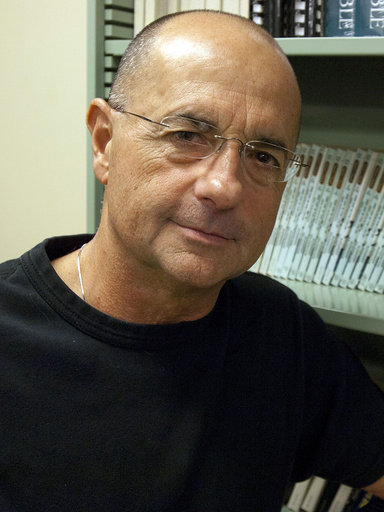Editor’s Note: Following the passing of Professor Jay Holstein on Nov. 14, 2025, University of Iowa alumnus and longtime friend, John Shallman, shared the following open letter to Holstein’s students.
To the Students of Professor Jay Holstein—Past, Present, and Eternal
We’ve lost our teacher.
But Jay—being Jay—would probably shrug and say, “Well, what did you expect? No one gets out of this gig alive.”
That was literally my first moment in his classroom in Macbride Hall. He walked in wearing a black leather jacket and aviators—like the frontman of a band named Rabbis of the Apocalypse—looked at all of us trembling freshmen, and opened with one of the greatest icebreakers in the history of higher education:
“We are all going to die. Ecclesiastes. So, make every day count.”
Welcome to college, kids.
That was the full Holstein package—irreverent, hilarious, startlingly direct, and in the very same breath, profoundly humane. He could demolish your naïve ideas about God, morality, suffering, or whatever half-baked philosophy you thought you invented in the dorms—all with one raised eyebrow. Then he’d quietly hand you something sturdier to build on: truth, humility, curiosity, maybe even hope.
Jay teased us relentlessly. He mocked our seriousness, our certainty, our, “I read half the book last night so I’m basically Socrates now—minus the thinking part” energy. And then he’d drop a line that cracked open the whole universe.
He taught The Death of Ivan Ilyich like Tolstoy wrote it for him personally. When Ivan realizes, on his deathbed, that his life was “not the real thing,” Jay would lean on the desk, lower his voice, and say: “So don’t wait for death to learn how to live.” Silence. Goosebumps.
Holstein wins again.

He could jump from The Epic of Gilgamesh to Siddhartha without pausing for air—from the king seeking immortality to the seeker finding it in a river. “Gilgamesh tried to beat death,” Jay said. “Siddhartha tried to understand it. Either way, you don’t win. But you can wake up.”
At first, I mostly loved Hemingway’s The Old Man and the Sea because, well, it was so short. I thought I had better things to do than read. But then I’d hear Jay read this quote in class:
“A man can be destroyed, but not defeated.”
He didn’t just quote it—he lived it and wanted us to live it. The Old Man and the Sea wasn’t about the fish; it was about the fight. Jay taught us to fight too. Not against the sea, but against complacency, cynicism, laziness, and the spiritual sleepwalking he could spot from across the room.
Jay faced life’s absurdities—and ours—with a grin that said, “Relax. You’re not special. You’re confused like the rest of us.” And yet his swagger, his wise-guy grin, and his enormous generosity somehow made us feel special anyway. He gave you time he didn’t have. He’d tell you to “go back and read it again—slower,” and it was never an insult. It was an invitation.
Holstein always talked about how the best writing is iceberg writing, as Hemingway framed it—most of the meaning buried below the surface. Ironic communication, symbols, metaphors—these were the breadcrumbs I needed to follow. In a sense, Holstein didn’t just teach me how to read; he taught me how to see. Each book we read in class was a flashlight, illuminating a path in the dark; and every book he gave me wasn’t just a window into the world ahead, but into my own heart and my own soul.
Years after I graduated, I was invited to speak at his 50th anniversary celebration and eventually to lecture in his class about the book I authored. It was surreal to stand in front of a classroom with Jay sitting there, listening. I was unbelievably honored—and terrified—lecturing in front of the master. I did my best. I spoke about history, faith, family—all the things Jay taught me were really one subject. At dinner that night, he made us laugh so loudly the waiter considered calling security.
He’d probably hate this letter. Too earnest. Too many metaphors. He’d smirk and say,“ Shallman, you’re ladling it on a little thick.” And he’d be right. Because Jay knew better than anyone that meaning isn’t declared—it’s discovered.
So, to all of Jay’s students—from Iowa City to everywhere his voice still echoes—here’s what we carry forward:
Read deeply.
Laugh loudly.
Question everything.
And live awake.
Not only did Professor Holstein teach us how to read books—he changed how we read the world. And that ripple—that widening, widening ripple—is the legacy he leaves in all of us.
May his memory be a blessing, a dare, and a lamp for those still finding their way. And may we, as Jay insisted from day one, make every day count.
—John Shallman (86BA)